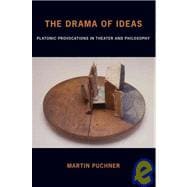
What is included with this book?
| The Poetics of the Platonic Dialogue | p. 3 |
| Plato, Dramatist | p. 3 |
| Plato's Genres: Tragedy, Comedy, Satyr Play | p. 9 |
| Plato's Dramaturgy | p. 20 |
| A Brief History of the Socrates Play | p. 37 |
| Socrates on the Stage | p. 40 |
| The Death of Socrates | p. 52 |
| The Comic Stage Philosopher | p. 63 |
| The Drama of Ideas | p. 73 |
| The Modern Socrates Play | p. 75 |
| Oscar Wilde | p. 82 |
| George Bernard Shaw | p. 92 |
| Luigi Pirandello | p. 100 |
| Bertolt Brecht | p. 106 |
| Tom Stoppard | p. 112 |
| Dramatic Philosophy | p. 121 |
| Søren Kierkegaard | p. 125 |
| Friedrich Nietzsche | p. 138 |
| Jean-Paul Sartre and Albert Camus | p. 148 |
| Kenneth Burke | p. 162 |
| Gilles Deleuze | p. 166 |
| The New Platonists | p. 173 |
| Iris Murdoch | p. 174 |
| Martha Nussbaum | p. 180 |
| Alain Badiou | p. 185 |
| Epilogue: Dramatic Platonism | p. 193 |
| Socrates Titles | p. 199 |
| Charting the Socrates Play | p. 209 |
| Notes | p. 211 |
| Bibliography | p. 237 |
| Index | p. 245 |
| Table of Contents provided by Ingram. All Rights Reserved. |
The New copy of this book will include any supplemental materials advertised. Please check the title of the book to determine if it should include any access cards, study guides, lab manuals, CDs, etc.
The Used, Rental and eBook copies of this book are not guaranteed to include any supplemental materials. Typically, only the book itself is included. This is true even if the title states it includes any access cards, study guides, lab manuals, CDs, etc.